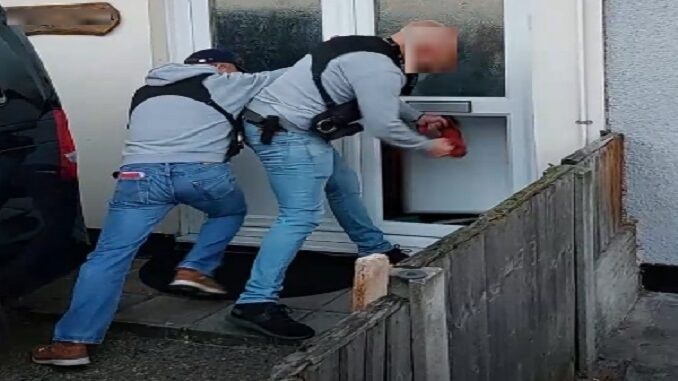
Despite reports of chaos over at NATIS, the police department tasked with investigating suspected BBL fraud, with officers leaving or transferring out of that Department due to them not knowing their future is secure within it, and with those suspected of BBL wrongdoing getting letters inviting them to a local police station to explain themselves, instead of a knock at their door, or even worse a door ram smashing open their door, that department is still very active.
In this BBL news update I will give you an insight into the role of those officers and what they are looking for when it comes to suspected BBL fraud.
Department for Business and Trade
The Department uses enforcement agencies to investigate, prosecute and recover funds for large-scale fraud cases, but the agencies’ capacity is stretched.
The Department uses enforcement agencies, such as the National Investigation Service (NATIS), to investigate, prosecute, and recover funds for top-tier and the ‘higher end’ of mid-tier loans.
Given the potential fraud levels across all COVID-19 schemes, however, enforcement agencies are stretched.
Top, Middle and Bottom Tier BBL Fraud
Owing to the scale of possible fraud, and limited resources, the Department for Business and Trade is prioritising the pursuit of organised crime. The Department prioritised its fraud response by grouping loans into three tiers and concentrating on the highest risk areas
Top-tier – loans are those involving organised crime groups with sums of more than £100,000.
Mid-tier – some evidence that borrowers acted dishonestly but not on a large scale.
Bottom-tier – where individuals might have dishonestly received loans.
The Department could not tell us how many cases were in each tier. It decided not to focus its investigative resource on borrowers who overstated turnover by less than 25%, provided there were no other fraud risk indicators.
It expects lenders to pursue upfront recovery where feasible and cost-effective to do so, and to always seek recovery action where loans are not repaid. This prioritisation approach risks diminishing the deterrent effect of counter-fraud activity.
Counter Fraud Measures
Government Departmental accounting officers are responsible for managing their organisation’s response to fraud and error. For individual projects and programmes, that responsibility is often taken on by a senior responsible officer.
In the case of the BBL Scheme, the Department for Business and Trade is responsible and accountable for counter-fraud activity and is responsible for the relationship with other governmental bodies, such as the National Crime Agency (NCA), the National Investigation Service (NATIS) and the Insolvency Service. The British Business Bank (the Bank) manages most of the remaining fraud risk on its behalf.
NATIS Workload
NATIS had received more than 2,100 intelligence reports about alleged fraud, both directly and through a Crimestoppers COVID fraud hotline, set up to allow individuals to report fraud during the pandemic.
The Department has set NATIS a target to recover at least £6 million of fraudulent loans from organised crime over three years, which is equal to the amount the Department agreed NATIS could spend on its caseload for the Scheme.
This meant, however, that NATIS was able to investigate a maximum of 50 cases per year after triaging a larger number of cases. The Department intended to seek support from regional police forces and the NCA to mitigate the need to expand NATIS’s caseload
Genuine Business Owners Blagging the BBL Scheme
In instances where NATIS examines legitimate businesses for suspected BBL wrongdoing, they aim to ascertain the following through interviews and document analysis:
- Accuracy of the business turnover stated in the loan application, and whether it was significantly inflated.
- Number of loans sought per business, considering that only one was permitted.
- Actual usage of the lent funds.
- Regularity of loan repayments.
- Borrower’s capacity to repay the loan.
If multiple loans were acquired for a single company with a gross exaggeration of turnover to maximize the loan payout, a prosecution is highly probable.
However, in cases where turnover is shown to be somewhat inflated, yet the individual under scrutiny consistently meets repayments and demonstrates the financial ability to continue or settle the entire loan, NATIS is receptive to legal representations to avoid criminal sanctions.
They acknowledge the impracticality of prosecuting everyone and seek fair resolution.
Out and Out BBL Blaggers
On the other hand, cases involving organized crime will be treated distinctly. Numerous loans granted to fictitious or insolvent companies, where repayment was never intended, will be prosecuted, followed by Proceeds of Crime Act proceedings upon conviction.
NATIS has a singular objective and that is to recover as much criminal property as possible from those who fraudulently obtained loans.
Prosecuting business owners who deviated from loan criteria, not out of greed but genuine fear of losing their hard-earned assets, and who are actively repaying, is viewed as a potential misuse of taxpayers’ money.
Recent Cases
Here are all recent cases involving the Bounce Back Loan Door-Kicking Police
London and Birmingham Properties Raided as Part of a £2Million Bounce Back Loan Fraud Investigation
Alleged Blackburn Based Business Grant Blagger Gets Their Collar Felt By The BBL Fraud Squad








